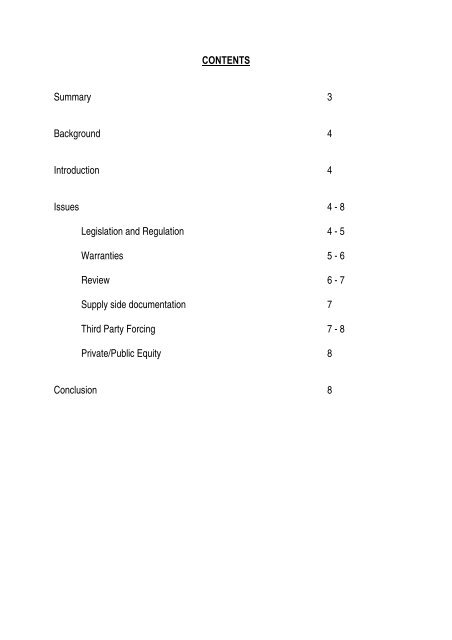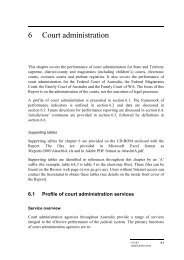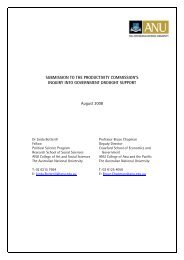Motor Trades Association of Queensland (PDF - 58 Kb) - Productivity ...
Motor Trades Association of Queensland (PDF - 58 Kb) - Productivity ...
Motor Trades Association of Queensland (PDF - 58 Kb) - Productivity ...
You also want an ePaper? Increase the reach of your titles
YUMPU automatically turns print PDFs into web optimized ePapers that Google loves.
CONTENTS<br />
Summary 3<br />
Background 4<br />
Introduction 4<br />
Issues 4 - 8<br />
Legislation and Regulation 4 - 5<br />
Warranties 5 - 6<br />
Review 6 - 7<br />
Supply side documentation 7<br />
Third Party Forcing 7 - 8<br />
Private/Public Equity 8<br />
Conclusion 8
Summary<br />
The <strong>Motor</strong> <strong>Trades</strong> <strong>Association</strong> <strong>of</strong> <strong>Queensland</strong> (MTAQ) responds to the request for a submission<br />
following the appearance <strong>of</strong> Chief Executive Officer Aivars Blums at the 26 March 2007,<br />
Brisbane round table meeting.<br />
In the 21 st century the multiplicities <strong>of</strong> State and Territory legislation and regulations with their<br />
inconsistencies applying to motor dealers and consumers have out-used their usefulness.<br />
Our preference would be for a harmonisation <strong>of</strong> consumer legislation including a national<br />
licensing system across State and Territory jurisdictions that is cost efficient, enforceable and<br />
responsive to changes in the market and the industry particularly for the motor vehicle retailing<br />
sector<br />
It is the MTAQ’s preference for specific and common motor dealer laws incorporating consumer<br />
protection as the alternative to the current generic approach. The CPF process provides the<br />
springboard for a robust national review <strong>of</strong> the motor vehicle retail sector which would lead to a<br />
balance between the supply side and the demand side that reflects the current market and<br />
operation.<br />
Referring specifically to motor dealers, we encourage the <strong>Productivity</strong> Commission under the<br />
aegis <strong>of</strong> the CPF to consider a consultative review process to:<br />
• establish the case for legislative and regulatory consistency and action in the motor<br />
retailing/consumer sector;<br />
• identify legislative and regulative relevancy, net benefit to consumers, costs and<br />
benefits including compliance costs and inefficiencies;<br />
• examine the dynamics <strong>of</strong> the market including the statutory requirement for dealers to<br />
provide a warranty on motor vehicles up to 20 years old which distorts the market in<br />
favour <strong>of</strong> “backyarders” and if sold for restoration can be sold without warranty; and<br />
• examine feasible policy options such as self-regulation and co-regulation for the new<br />
motor vehicle sector including the roles <strong>of</strong> franchising and new car manufacturer’s<br />
warranties.<br />
The purpose would be to achieve for the motor car retailing industry a national system <strong>of</strong><br />
accreditation and consumer protection applying to all jurisdictions supported by a<br />
comprehensive educative process.<br />
The MTAQ considers that consumer legislation should have the competency to protect both the<br />
demand and supply sides <strong>of</strong> the transactions and be cost efficient, enforceable and responsive<br />
to changes in the market and the industry.<br />
There is a case for considering the supply side especially where the supplier either does not<br />
have direct contact with the consumer or is a distributor or a retail intermediary on behalf <strong>of</strong> the<br />
manufacturer<br />
The CPF should ideally incorporate cost effective readily accessible and timely mechanisms for<br />
both the demand side and supply side redress.
MOTOR TRADES ASSOCIATION OF QUEENSLAND<br />
Submission<br />
<strong>Productivity</strong> Commission<br />
Review <strong>of</strong> Consumer Policy Framework<br />
BACKGROUND:<br />
The <strong>Motor</strong> <strong>Trades</strong> <strong>Association</strong> <strong>of</strong> <strong>Queensland</strong> (MTAQ) is the peak organisation in the State representing<br />
the interests <strong>of</strong> 2500 businesses in the retail, repair and service sector <strong>of</strong> the Australian <strong>Motor</strong> Industry<br />
value chain. The <strong>Association</strong> represents and promotes the issues <strong>of</strong> the automotive industries to all<br />
levels <strong>of</strong> government and within <strong>Queensland</strong>’s economic structure.<br />
The MTAQ comprises 14 separate divisions, each representative <strong>of</strong> a specialist area <strong>of</strong> the State’s autoindustry.<br />
They are - Automobile Dealers’ <strong>Association</strong>; Farm and Industrial Machinery Dealers; Auto<br />
Electrical Specialists; <strong>Motor</strong>cycle Industry; Combined Mechanical Repairer Specialists; Tyre Dealers &<br />
Retreaders; Engine Re-conditioners; Rental Vehicle Industry; Independent Tow Truck Operators;<br />
Service Station & Convenience Store <strong>Association</strong>; National Auto Collision Alliance; Used Car;<br />
Automotive Under Car and Auto Parts Recyclers.<br />
Introduction<br />
The MTAQ responds to the request for a submission following the appearance <strong>of</strong> Chief Executive<br />
Officer Aivars Blums at the 26 March 2007, Brisbane round table meeting.<br />
The Consumer Policy Framework (CPF) is <strong>of</strong> direct relevance to the motor trade’s value chain.<br />
<strong>Productivity</strong> outcomes and the economic performance and consumer satisfaction levels are influenced<br />
by the architecture <strong>of</strong> the CPF.<br />
ISSUES<br />
Legislation and Regulation<br />
Nationally, the motor vehicle industry involves over 100,000 retail motor trade businesses with a<br />
combined annual turnover <strong>of</strong> over $120 billion employing over 316,000 people. Each state has<br />
their own system for licensing and regulating persons in the property and motor vehicle markets<br />
to achieve a balance between protection <strong>of</strong> consumers and the freedom <strong>of</strong> the enterprise in the<br />
market place.<br />
In Western Australia and Victoria for example there is specific legislation for motor dealers<br />
(<strong>Motor</strong> Dealers Act) and (<strong>Motor</strong> Car Traders Act) governing motor dealer and consumer<br />
transactions. In <strong>Queensland</strong>, motor dealers are under the umbrella legislation - Property<br />
Agents and <strong>Motor</strong> Dealers Act (PAMD) - with real estate agents, property developers,<br />
commercial agents, pastoral houses, auctioneers and sales people.<br />
Each <strong>of</strong> the state and territory legislative measures is substantial. For example the PAMD has<br />
close to 650 sections, 2 schedules, <strong>58</strong> regulations, and schedules for fees, commission charges<br />
and licensing qualifications including 6 separate Codes <strong>of</strong> Conduct for the regulated<br />
occupations.
Mutual Recognition Act 1992 (Cwth) provides that persons with an occupational licence issued<br />
in a State or Territory <strong>of</strong> the Commonwealth is entitled to have that licence recognised in (for<br />
example) <strong>Queensland</strong> under most, but not all, circumstances. Under the Trans-Tasman Mutual<br />
Recognition (Qld) Act 2003, people registered in New Zealand have the same rights.<br />
Applicants are deemed to be licensed in (for example) <strong>Queensland</strong> once they possess a receipt<br />
for the applicable fee and hold a current, equivalent licence at time <strong>of</strong> lodgement.<br />
Extrapolated across the federation and coupled with State and Territory Fair Trading Acts - and<br />
leaving aside related Commonwealth provisions - there is a plethora <strong>of</strong> laws applying to motor<br />
dealer and consumer actions.<br />
In the 21 st century the multiplicities <strong>of</strong> State and Territory legislation and regulations with their<br />
inconsistencies applying to motor dealers and consumers have out-used their usefulness.<br />
It seems incongruous that a motor vehicle sale transacted in <strong>Queensland</strong> requires a contract<br />
which is approximately three (3) times as long as that for a similar transaction in Western<br />
Australia, yet the level <strong>of</strong> consumer protection is deemed to be similar in both jurisdictions.<br />
Our preference would be for a harmonisation <strong>of</strong> consumer legislation including a national<br />
licensing system across State and Territory jurisdictions that is cost efficient, enforceable and<br />
responsive to changes in the market and the industry particularly for the motor vehicle retailing<br />
sector.<br />
It is noted the Small Business Coalition 1 has urged the Coalition <strong>of</strong> Australian Governments to<br />
progress commitments that will harmonise a number <strong>of</strong> problematic areas. i The MTAQ is <strong>of</strong> the<br />
view that motor dealers should have been included in that list.<br />
Warranties<br />
We urge the <strong>Productivity</strong> Commission to consider the role <strong>of</strong> warranties and franchising as<br />
mechanisms to determine a structure for the motor vehicle retail market from which would flow<br />
the inputs to the CPF.<br />
Warranties are nationally recognised legal and enforceable documents designed to protect the<br />
consumer imposing direct obligations on the motor vehicle dealer. Warranties are not bound by<br />
jurisdictional boundaries.<br />
There are three types <strong>of</strong> warranties applying to motor vehicles:<br />
1. New car statutory warranty<br />
New car statutory warranties cover for 12 months or 20,000 km, whichever reached<br />
first. This warranty in most cases covers all defective items on a car.<br />
1<br />
Coalition <strong>of</strong> Small Business consists <strong>of</strong>: ACT & Region Chamber <strong>of</strong> Commerce and Industry; <strong>Association</strong> <strong>of</strong> Consulting Engineers<br />
Australia; Australian Chamber <strong>of</strong> Commerce and Industry; Australian Hotels <strong>Association</strong>; Australian Newsagents’ Federation Limited;<br />
Australian Petroleum Agents and Distributors <strong>Association</strong>; Business Enterprise Centres Australia; Chamber <strong>of</strong> Commerce and Industry<br />
Western Australia; Commerce QLD; Council <strong>of</strong> Small Business Organisations <strong>of</strong> Australia; CPA Australia; Franchise Council <strong>of</strong> Australia;<br />
Institute <strong>of</strong> Chartered Accountants; Masters Builders Australia; Master Plumbers & Mechanical Services <strong>Association</strong> <strong>of</strong> Australia; <strong>Motor</strong><br />
<strong>Trades</strong> <strong>Association</strong> <strong>of</strong> Australia; National Electrical and Communications <strong>Association</strong>; National Farmers Federation; National Institute <strong>of</strong><br />
Accountants; NSW Business Chamber; Pharmacy Guild <strong>of</strong> Australia; Real Estate Institute <strong>of</strong> Australia; Restaurant & Catering Australia;<br />
Small Enterprise Telecommunications Centre Limited; Tasmanian Chamber <strong>of</strong> Commerce and Industry; Victorian Automobile Chamber <strong>of</strong><br />
Commerce.
2. New car manufacturer's warranty<br />
This generally exceeds the statutory warranty. Generally it will be two-year/40,000 km<br />
or three-year /60,000 km.<br />
3. Used car statutory warranty<br />
This applies to all dealer-sold passenger cars with less than 160,000 km and under 10<br />
years old. The warranty is valid for three months or 5,000 km from date <strong>of</strong> purchase.<br />
This warranty will cover most items on a car relating to safety, reliability and<br />
roadworthiness.<br />
In some jurisdictions a one-month or 1000 km warranty applies to vehicles older than<br />
10 years or with more than 160,000 kms on the clock. It should be noted that Australia<br />
has the most dated inventory <strong>of</strong> personal transport vehicles <strong>of</strong> any <strong>of</strong> the first world<br />
nations and <strong>Queensland</strong> the oldest stock <strong>of</strong> motor vehicles in the commonwealth.<br />
New car statutory warranties and new car manufacturer’s warranties coupled with franchise<br />
arrangements tie motor dealers to agreed standards <strong>of</strong> consumer service and protection.<br />
Dealer breach <strong>of</strong> a new car warranty may be the subject <strong>of</strong> a dispute resolution process<br />
engaging owner, the manufacturer and dealer in discussions or alternatively legal enforcement<br />
governed by the consumer law <strong>of</strong> the particular state or territory.<br />
Breach <strong>of</strong> a used car warranty is similar excepting the role <strong>of</strong> the manufacturer.<br />
Review<br />
It is noted that the Australian Government has a consultative process with the franchising<br />
industry underway on the implementation <strong>of</strong> the Australian Government’s response to a review<br />
<strong>of</strong> the disclosure provisions <strong>of</strong> the Franchising Code <strong>of</strong> Conduct, with changes likely to be made<br />
law after the Budget.<br />
The use <strong>of</strong> overarching industry legislation such as <strong>Queensland</strong>’s PAMD which provides<br />
consumer protection for both the real estate and motor vehicle sectors is difficult to change<br />
because any review involves both the industries making it a complex and drawn out process<br />
such as the 2006 review by the <strong>Queensland</strong> Office <strong>of</strong> Fair Trading.<br />
It is the MTAQ’s preference for specific and common motor dealer laws incorporating consumer<br />
protection as the alternative to the current generic approach. The CPF process provides the<br />
springboard for a robust national review <strong>of</strong> the motor vehicle retail sector which would lead to a<br />
balance between the supply side and the demand side that reflects the current market and<br />
operation.<br />
Referring specifically to motor dealers, we encourage the <strong>Productivity</strong> Commission under the<br />
aegis <strong>of</strong> the CPF to consider a consultative review process to:<br />
• establish the case for legislative and regulatory consistency and action in the motor<br />
retailing/consumer sector;<br />
• identify legislative and regulative relevancy, net benefit to consumers, costs and<br />
benefits including compliance costs and inefficiencies;
• examine the dynamics <strong>of</strong> the market including the statutory requirement for dealers to<br />
provide a warranty on motor vehicles up to 20 years old which distorts the market in<br />
favour <strong>of</strong> “backyarders” and if sold for restoration can be sold without warranty; and<br />
• examine feasible policy options such as self-regulation and co-regulation for the new<br />
motor vehicle sector including the roles <strong>of</strong> franchising and new car manufacturer’s<br />
warranties.<br />
The purpose would be to achieve for the motor car retailing industry a national system <strong>of</strong><br />
accreditation and consumer protection applying to all jurisdictions supported by a<br />
comprehensive educative process.<br />
As pointed out in the Issues Paper many actions associated with the motor vehicle retail market<br />
(and others) access centralised services such as national credit and vehicle and driver<br />
information checks.

















